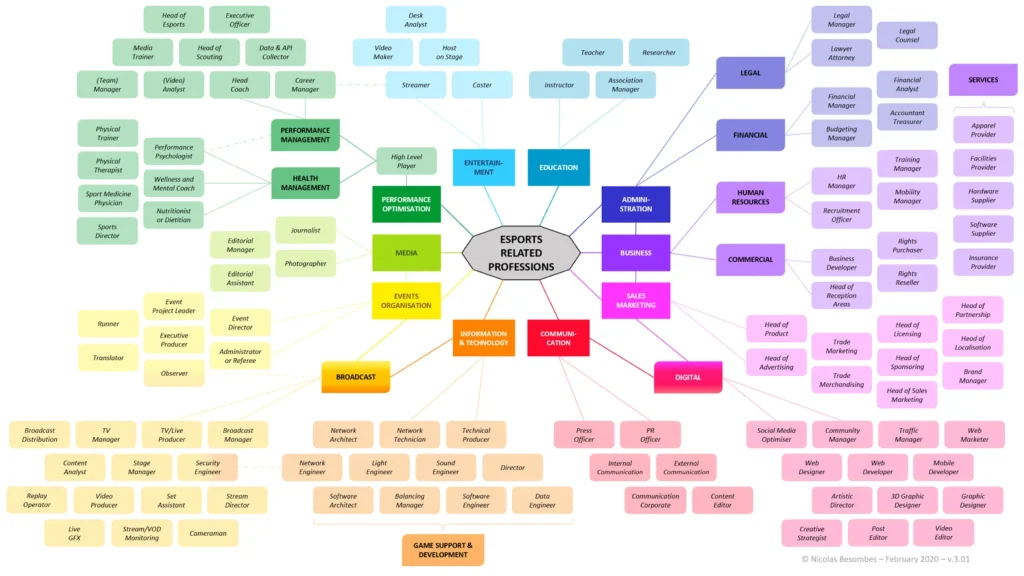Esports career opportunities have exploded in recent years, turning competitive gaming from a casual pastime into a legitimate profession for many players, with leagues, sponsorships, and structured paths that reward practice, consistency, and strategic growth as much as speed and reflexes. To convert talent into a sustainable income, you need more than flashy reflexes—you need a clear plan, disciplined daily practice, a deep understanding of the esports ecosystem, smart time management, and a willingness to learn from both wins and losses. If you’re wondering how to start in esports, this guide shares practical steps, battle-tested strategies, and a practical esports career roadmap that maps your first 12 to 18 months from apprentice to aspiring contender. Along the way, you’ll learn about branding, exposure, and how to build a personal, authentic brand that resonates with teams, sponsors, and fans, while adopting essential esports career tips like consistency, transparency, and constructive feedback. With perseverance, you can translate deliberate practice into measurable results and pursue a durable professional gaming career that adapts to evolving titles, formats, and opportunities across the global circuit.
Beyond the basics, the field rewards a blend of discipline, media literacy, and strategic networking, creating a pro gamer trajectory that weaves together team roles, coaching, analytics, and content creation within the wider electronic sports ecosystem. Understanding opportunities in the competitive circuit, sponsorships, and coaching roles helps newcomers see a realistic path from entry-level practice to trusted advisor or mentor roles. Think of this path as a layered curriculum in digital sport, where performance on stage is matched by a strong online presence, thoughtful branding, and a willingness to adapt to changing games and audiences. By framing your ambitions within a scalable plan and seeking mentors, you can move from practice rooms to competition floors with purpose and clarity.
Esports Career Roadmap: From Beginner to Pro
Emerging into an Esports Career Roadmap means turning curiosity into a structured plan. The journey starts with understanding the esports landscape and identifying where you fit within the competitive gaming ecosystem. By mapping four core steps—self-assessment, deliberate skill development, exposure to events, and consistent branding—you move from casual play to a professional gaming trajectory. An esports career is built on disciplined practice, tangible results, and a personal brand that stands out to teams, sponsors, and fans.
To start in esports, think in phases. If you’re asking how to start in esports, Phase 1 (0-3 months) centers on core mechanics, daily drills, and a simple content presence. Phase 2 (3-9 months) emphasizes higher-tier amateur events, refined signature plays, and growing tournament results. Phase 3 (9-18 months) targets official team trials and expanded networks, while Phase 4 (18+ months) focuses on securing a role on a recognized team or transitioning into coaching, analytics, or streaming. Along the way, assemble a portfolio of results, clips, and analytics, plus an online presence that demonstrates value beyond win-loss records. The esports career roadmap should include concrete milestones—first roster trial, first sponsorship inquiry, and first major qualifier.
Building Skills and Exposure for a Sustainable Esports Career
Training for competitive gaming blends physical readiness, mental strategies, and game-specific practice. Create a well-rounded routine with mechanical training (aim and timing), game sense (maps, rotations, economy), and teamwork (communication, shot-calling). Use VOD reviews and analytics to translate game footage into concrete adjustments. Maintain health—sleep, hydration, and posture—to sustain peak performance during long tournaments.
Your professional profile surfaces from on-platform results and professional exposure. Track tournament placings, build a highlight reel, and engage with teams using concise, tailored messages that demonstrate your value. A steady content strategy—tutorials, match breakdowns, and behind-the-scenes streams—expands your audience and attracts sponsorships. Keep branding consistent and professional, because conduct, responsiveness, and a growth mindset are highly valued in the esports career landscape.
Frequently Asked Questions
How do you start in esports and create an esports career roadmap for competitive gaming?
To start in esports and craft an esports career roadmap for competitive gaming: 1) pick one core game and specialize deeply; 2) draft a 90-day practice plan with daily drills, weekly scrims, and measurable goals; 3) gain exposure through open qualifiers, local events, and online leagues while building a tournament results portfolio; 4) develop a simple content strategy and a highlight reel to showcase your learning and decision-making; 5) build a consistent personal brand and reach out to teams or coaches for opportunities; and 6) treat it as a professional journey focused on skill, consistency, and networking to advance toward professional gaming.
What are essential esports career tips to turn competitive gaming into a sustainable professional gaming path?
Esports career tips for turning competitive gaming into a sustainable professional gaming path: diversify income early with streaming, coaching, and content; focus on longevity through branding and networking; build a support network of mentors and teammates; stay adaptable to new titles and opportunities; maintain mental health and balanced routines; and continually refine your skills with VOD reviews and analytics. Use a clear esports career roadmap to set phases, track progress with concrete metrics, and share your journey through highlights and analyses to attract teams and sponsors.
| Topic | Key Points |
|---|---|
| Understanding the esports landscape |
|
| What counts as competitive gaming? |
|
| Mapping your path to an Esports career |
|
| How to start in esports: practical steps |
|
| Training for competitive gaming and skill development |
|
| Building your professional profile: teams, sponsorships, and content |
|
| Esports career tips and common pivots |
|
| Esports career roadmap: from beginner to pro |
|
| Myths, realities, and avoiding common mistakes |
|
| A practical 90-day plan to begin today |
|

